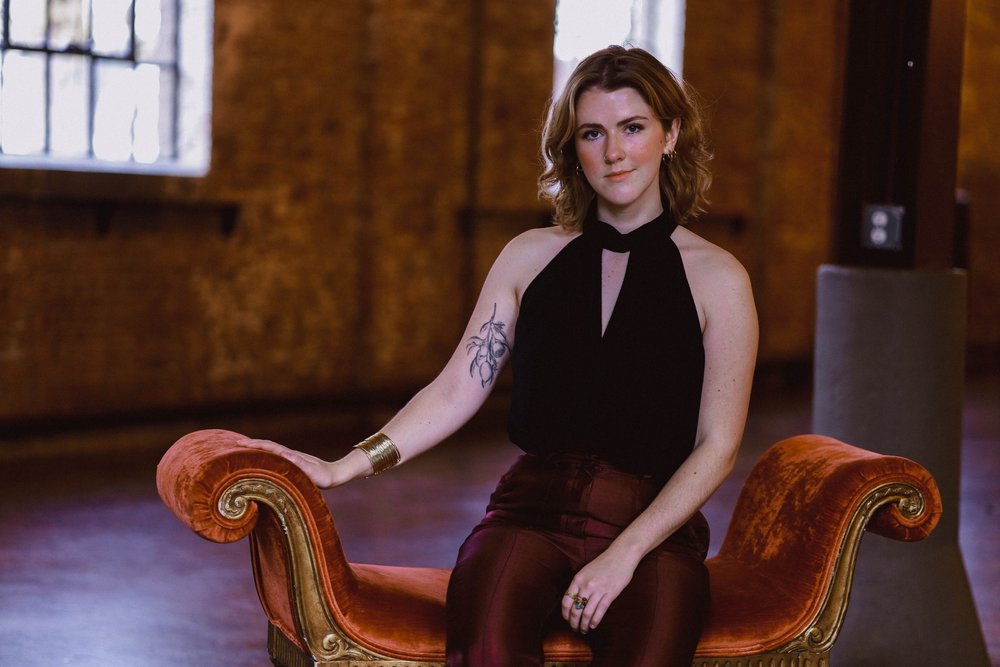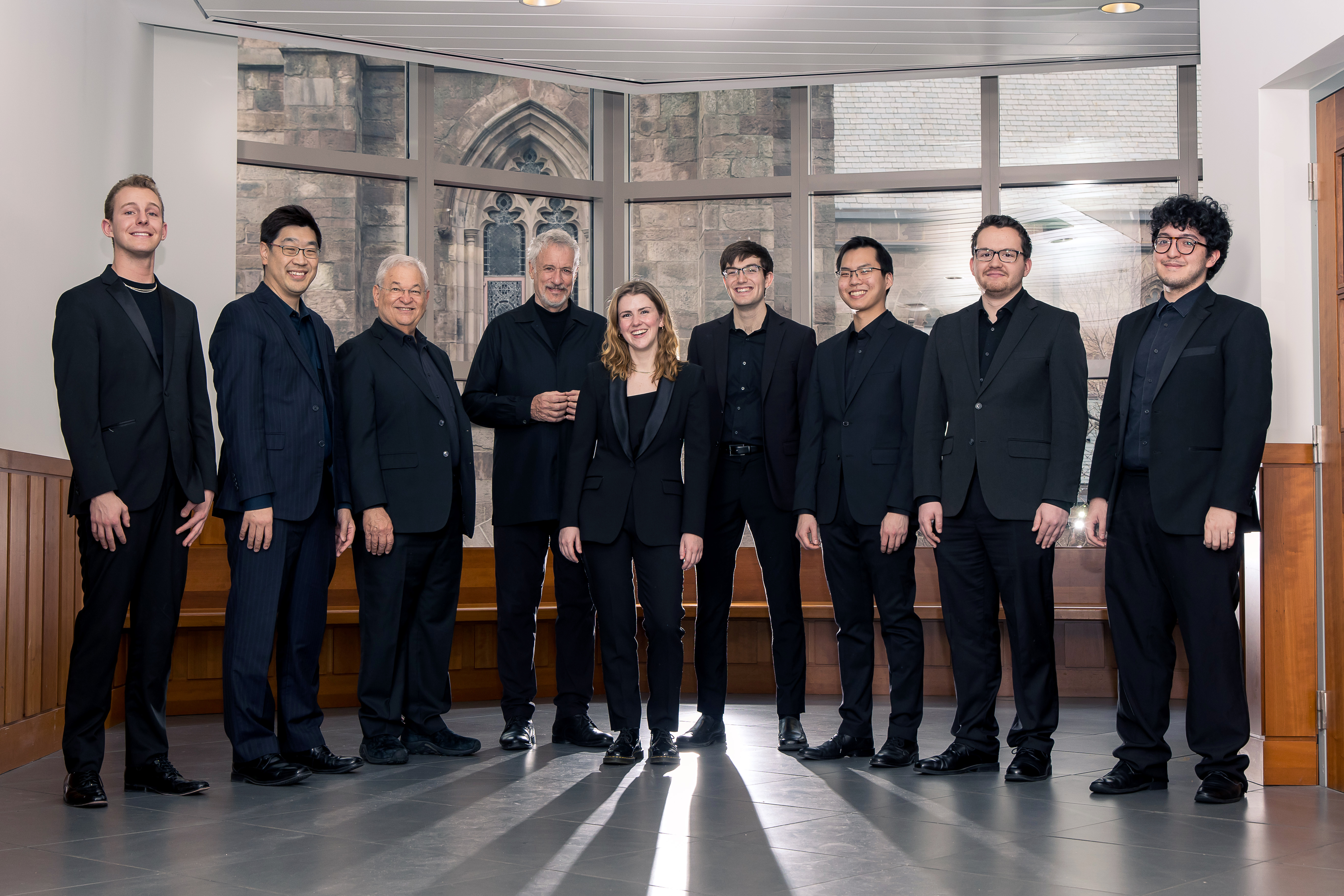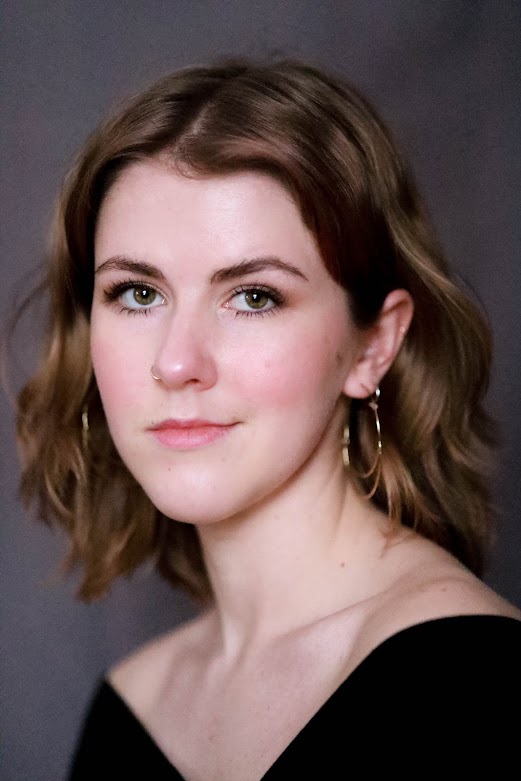Meet the Student: Q&A with Conductor Micah Gleason (Part I)

Micah Gleason, from Chapel Hill, North Carolina, entered the Curtis Institute of Music in 2022 and is the conductor of Igor Stravinsky’s L’Histoire du Soldat (The Solder’s Tale) and the world premiere engagement of Nick DiBerardino’s Darmok & Jalad. The work receives its Philadelphia premiere on March 21 at the Philadelphia Film Center, part of the 2022–23 Curtis Presents series. As a conducting fellow, she works closely with Curtis mentor conductor Yannick Nézet-Séguin, music director of the Philadelphia Orchestra and the Metropolitan Opera. All students at Curtis receive merit-based, full-tuition scholarships, and Ms. Gleason is the Rita E. Hauser Conducting Fellow.

When did your musical journey begin, and what compelled you to pursue careers in conducting, classical voice, and chamber music?
My journey began quite late compared to many; I didn’t start seriously studying music voice until I was 16, but I fell in love with it pretty fast and very deeply! I was unbelievably lucky to receive a scholarship to attend Interlochen Arts Camp and subsequently Interlochen Arts Academy for my last two years of high school. Within my first three days at Interlochen I knew that this was it for me, and I would have no choice but to pursue music for the rest of my life. It was my first time singing in a really great choir, singing with orchestra, hearing an orchestra up close, and the whole thing felt unbelievably special and meaningful.
After my two years at Interlochen I continued on to study voice in college, and while living in Chicago during my undergrad, I had the opportunity to work as a singer in multiple capacities, both solo and ensemble, and I started to conduct here in there, mostly in choral settings. I was totally in love with the symphonic repertoire, but it was too late for me to start seriously pursuing playing an instrument in the orchestra, and I also had had enough experiences in opera as a singer to make me wonder if a singer might in fact be well-suited to conduct opera—so, when I auditioned for graduate school, I auditioned for both vocal and conducting programs, having really no idea if I was any good at conducting, but knowing it was something I really wanted to try to pursue.
I was lucky enough to be able to pursue Master of Music degrees in both Vocal Arts and Conducting at Bard College Conservatory of music. During my time there I started seriously studying orchestral conducting and working in opera more as a conductor. I am extremely lucky now to be continuing my conducting studies at Curtis, as I also continue to study and perform as a singer.
 This is your first time conducting L’Histoire du Soldat, and you’re uniquely positioned to collaborate with legendary artist John de Lancie. What has been your experience working with this ensemble as you breathe new life and expression into such a beloved work, one that has been performed countless times since its premiere in 1918?
This is your first time conducting L’Histoire du Soldat, and you’re uniquely positioned to collaborate with legendary artist John de Lancie. What has been your experience working with this ensemble as you breathe new life and expression into such a beloved work, one that has been performed countless times since its premiere in 1918?
It is my first time! And what a treat to work with these artists for my first time doing this monumental work. This piece is an interesting one because it is really a chamber work, but due to the theatrical nature of the piece, and the difficulty of the music, it is sometimes necessary (or at least helpful!) to have a conductor. In this particular iteration of the performance, I think of myself more as a big band leader in a way—bringing my colleagues in and out, conducting when it’s helpful, and stepping back to let the music breathe when that’s what’s called for. Doing it with Soovin Kim and David Shifrin, both legendary chamber musicians who have done this piece countless times has been a real treat and a wonderful learning experience for myself and the others in the ensemble as well, I’m sure.
We only have one actor, and the piece technically has several different characters, but John de Lancie is doing an unbelievable job embodying all of them! I know I speak for all of the musicians when I say that we are having an absolute blast hearing him bring these characters to life, creating new implications for the characters’ motivations purely using the inflection of his voice.
Working with a living composer is a gift for any musician. Can you describe the rehearsal process as you prepare to unveil the world premiere of the new Star Trek-themed chamber work, Darmok & Jalad, by Nick DiBerardino?
It certainly is a gift to work with any living composer, and working with Nick is a distinct treat! So often when we perform the works of composers who are no longer living, we rely on scholarly research and hearsay to try to understand their influences and inspirations, and wonder at how that information might change the way we perform it. In this instance, I had the privilege of meeting with Nick and getting to hear straight from him what his inspirations were; what musical and textual (and textural!) elements of the piece he drew from outside sources, how they relate to each other, etc. Nick is a joy to be around any time, and it’s been great that he’s gotten to be around for the rehearsals and premiere of this piece. Anyone who’s played his music will tell you that it is not easy, but it’s very exciting and I think we all really get a thrill out of playing it.
 What do you relish the most about conducting and performing, and what are your favorite aspects of conducting an orchestra versus a chamber ensemble like L’Histoire?
What do you relish the most about conducting and performing, and what are your favorite aspects of conducting an orchestra versus a chamber ensemble like L’Histoire?
Wonderful question, they really are different skill sets in a way! One of the things that I love about doing chamber music myself is the riskiness of it; everyone has to be so tuned into each aurally in order to pull it off. One of my great fears about conducting chamber music is that I will interfere with the magic of listening and reacting in the moment that comes with chamber music. For this reason, as I mentioned earlier, in a lot of chamber works I try to have the conducting take a backseat in a way that it wouldn’t necessarily with larger ensemble music that really requires one person driving the car, so to speak! A piece like this Stravinsky is tricky because the players are conceptualizing the meter in different ways, but in a piece that is less rhythmically driven, one of the most important things I would think about is allowing the music to breathe and making sure that my conducting didn’t ever prevent that.
 Conducting an orchestra is exhilarating, but also terrifying because at times I can really feel like driving a big Mac truck down a mountain- it’s a beautiful and gigantic beast, and once you push it in a certain direction, it is hard to pull and push unless the orchestra knows the music really well, and there’s a lot of mutual trust between the orchestra and the conductor. However, for this reason also, it is an unbelievably special experience to have a large orchestra that feels like one being, moving and breathing together.
Conducting an orchestra is exhilarating, but also terrifying because at times I can really feel like driving a big Mac truck down a mountain- it’s a beautiful and gigantic beast, and once you push it in a certain direction, it is hard to pull and push unless the orchestra knows the music really well, and there’s a lot of mutual trust between the orchestra and the conductor. However, for this reason also, it is an unbelievably special experience to have a large orchestra that feels like one being, moving and breathing together.
You are taking this program out on eight stops around the U.S. with Curtis on Tour (March 10-26) with a performance here in Philadelphia on March 21. What excites you the most about taking it out on the road?
I think this is exactly what Stravinsky intended when he wrote the piece, and I’m so excited that the first time I am doing it is in this setting! He wrote it for a small, nimble group with the intention of it taking on characteristics of thêâter ambulant, or a traveling theater troupe. Every time we do the piece it will be slightly different, evolving and learning from each past performance. I am excited by the fact that we get to do it enough times that we will really see the piece evolve and grow as we hopefully grow more and more comfortable with it and with each other!
Interview with Micah Gleason by Ryan Scott Lathan.
CURTIS PRESENTS: L’HISTOIRE DU SOLDAT (A SOLDIER’S TALE)
Tuesday, March 21, 2023 at 8 p.m.
Philadelphia Film Center
1412 Chestnut Street, Philadelphia
John de Lancie, narrator
Soovin Kim (’99), violin
William McGregor (’21), double bass
David Shifrin (’71), clarinet
Luis Marquez Teruel, bassoon
James Vaughen, trumpet
Derek Gullett, trombone
Tae McLoughlin, percussion
Micah Gleason, conductor
PROGRAM
| VIET CUONG | Well-Groomed | |
| FRANCIS POULENC | Sonata for Clarinet & Bassoon | |
| KRZYSZTOF PENDERECKI | Duo Concertante for Violin & Double Bass | |
| NICK DIBERARDINO | Darmok & Jalad | |
| IGOR STRAVINSKY | L’Histoire du Soldat |
Click HERE for more information.
Single tickets for L’Histoire du Soldat ($29) and are available at Curtis.edu. Seating is general admission.
Photos of Micah Gleason: 1, 2, 3, & 5.) Courtesy of Micah Gleason Photography. 4.) Left to Right: William McGregor (’22), double bass, Soovin Kim (’99), violin, David Shifrin (’71), clarinet, John de Lancie, narrator, Micah Gleason, conductor, James Vaughen, trumpet, Tae McLoughlin, percussion, Luis Marquez Teruel, bassoon, and Derek Gullett, trombone. Photo by Jeff Reeder.


